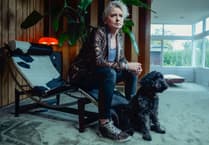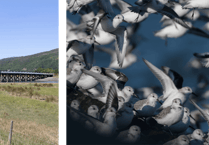The Devil’s Bridge man, who was convicted in a Western Australia court in May for his role in importing almost a tonne of drugs worth £540 million into the country, is facing the prospect of spending the rest of his life behind bars.
Scott Felix Jones, 40, who worked as an electrician in mid Wales and lived in Devil’s Bridge before moving to Australia, is considered to be one of the key brokers in the audacious scheme, prosecutors say — and deserves a life sentence.
Jones will be sentenced for his part in the scheme later this month, but his defence lawyer told the court in a sentencing submission that he was caught up in the operation that involved shipping drugs on a luxury yacht. The Zero was weighed down with almost a tonne of drugs that included hundreds of kilos each of meth, cocaine and MDMA.
The yacht was due to meet up with a Bayliner cruiser called DW140, which included Jones as one of the crew members before it ran around in September 2019.
WA’s Supreme Court was also told that it was only luck — or what prosecutor Darren Renton described as the “serendipitous action” of two boats running aground on Abrolhos Island reefs — that prevented the drugs reaching the streets of Perth and beyond, where their value could have been close to AUS$1 billion.
But during Jones’ trial, it was revealed that the cruiser also ran aground, and then ran away after they realised authorities were closing in on the drugs and the yacht’s skipper and first mate.
Details of the court proceedings have been provided courtesy of the West Australian.
During sentencing submissions on Thursday, Jones’ lawyer Stuart Shepherd attempted to distance Jones from his crewmates — saying he still maintained the first he knew of the drugs plot was on their boat’s third and final trip to the Abrolhos that September.
And he also said that meetings between his co-accused, Angus Jackson and Scott Lassiter, in Thailand in May of that year may not have been to plan importing drugs – they could have just been to drink and dance.
“There is no direct evidence of what was actually discussed,” Mr Shepherd said. “There is no evidence he knew about the yacht coming in at all.”
Prosecutor Darren Renton said by their verdicts, the jury had “roundly rejected” the tale about a boy’s trip to fish, snorkel and drink. And he also said Jones’ claim to be in the dark about the drugs until the 11th hour was “so improbable as to not be reasonable”.
Prosecutors last Tuesday laid out the crucial roles that Antoine Dicenta, Graham Palmer, Lassiter, Jackson and Jones played in sailing more than 900kg of narcotics from South Africa to Western Australia — and the punishment they should receive.
WA’s Supreme Court was also told that it was only luck — or what prosecutor Mr Renton described as the “serendipitous action” of two boats running aground on Abrolhos Island reefs — that prevented the drugs reaching the streets of Perth and beyond, where their value could have been close to $1bn.
In two separate trials, the ambitious plot to bring the massive drugs haul onshore in September 2019 was detailed — a plan hatched in Thailand, co-ordinated by a kingpin in Jersey, and then put into action by a yacht leaving Madagascar.
That yacht was skippered by French national Dicenta and his younger British crewmate Palmer — an erstwhile roofer from Swansea — who picked up the drugs in the middle of the Indian Ocean before sailing halfway around the world to bring them to Australia.
Meanwhile, sailing friends Jackson, Lassiter and Jones were recruited to meet the drugs in the Abrolhos, put them onto their powerboat and bring them ashore.
The Jersey-based man who recruited them — John Alexander Roy — was in regular contact with both sides of the operation via satellite phone. The court heard in testimony that Jones and Roy knew each other before they met the other players in a bar in London. Testimony in court also heard that Jones was linked to another scheme by Roy to import drugs.
Roy was powerless to assist when the Zero carrying the drugs, and then the Bayliner carrying the other three, both ran aground within hours of each other. Authorities began a major search and rescue mission after they found the yacht Zero abandoned with no crew on board.
They eventually found Dicenta and Palmer on Burton Island along with 40 duffel bags stuffed with the drugs hidden by rocks and seaweed.
Authorities also spotted the other boat, called DW140, cruising past which led to police chasing them up and eventually arresting those on board when they reached the mainland.
Jackson, Lassiter and Jones were found guilty by a jury. Dicenta and Palmer both admitted their roles — after a recording of them offloading and discussing the drugs was played to the court.
Mr Renton told Justice Michael Corboy that he should find all of them were involved in one of the most serious drug importations in Australian history — putting them in line for life behind bars.
“Where this offence sits, it is within the worst,” Mr Renton said.
“The length of time, the planning, the quantity... are far in excess of the comparable cases. And wholesale, we are looking at over 900kg.
“But for the serendipitous action of crashing on the reef, the venture was likely to have been successful.”
Mr Renton plotted out how from May 2019, when meetings in Thailand were held, the plan was put in place. Boats and cars were purchased, along with satellite phones, binoculars and other gear.
Travel to and from Perth was traced during the trial, and later analysis of phones and iPads allowed Australian federal police to plot the journey of the yacht from Madagascar via South Africa — and three trips the other boat to the Abrolhos from the WA coast.
Mr Renton said two earlier trips were aborted attempts to meet the drugs-laden yacht, which took weeks to cross the Indian Ocean.





Comments
This article has no comments yet. Be the first to leave a comment.